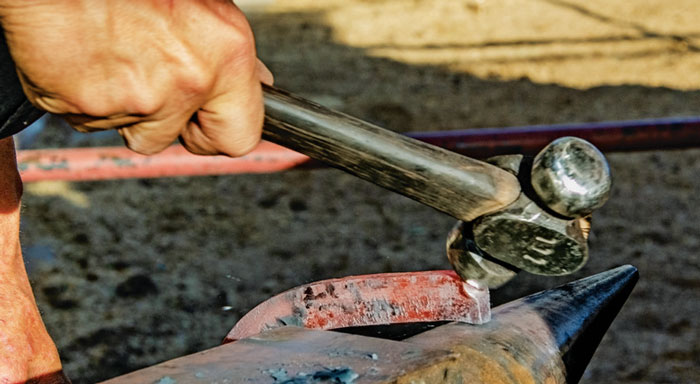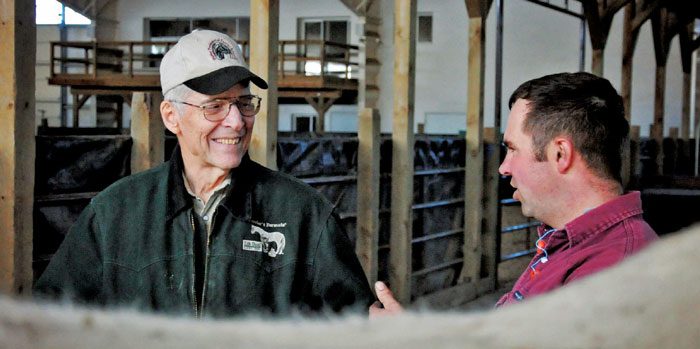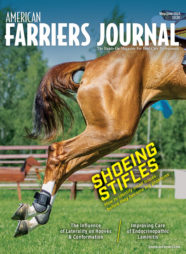The most important thing I learned about the shoeing business when I first started was how much I didn’t know about it. After interviewing several accomplished farrier businessmen and studying a number of business books, I assembled the material, added my own experience and published Six-Figure Shoeing. It received the “Best How-To” book award from the Colorado Independent Publishers Association in 2002. Testimonial letters from farriers who have been helped by the book have convinced me that the material remains relevant.
The three most important business strategies for farriers are:
- Invest and save for the future. You probably won’t do farrier work forever. Take money out of your business and put it into protected investments so you won’t have to keep doing this work when you don’t want to or are physically unable to.
- Know your costs by keeping accurate records. This will help you manage a sustainable business and might protect you from litigation. Knowing your true expenses will help you realize your value and be confident in your pricing.
- Choose to spend the most time with your best clients. I call these “A” customers. These are the people who value your work and you enjoy working for. They believe in you and believe only you are the most qualified to work on their horses.
Farrier work has its rewards, some of which are not monetary. The most rewarding aspect of therapeutic farrier work is seeing horses recover from devastating diseases, such as founder and navicular. I feel a deep sense of satisfaction when I can help other people get pleasure from their horses. The most rewarding aspect of show horseshoeing is sharing the exhilaration felt by trainers and owners when a horse wins that otherwise might not have. I feel good when I do this work. Sure, it’s easy to overdo it and get sore, but I feel my best when I’m active and working with one of God’s noblest creatures, the horse.
Takeaways
- Spend the most time with your best clients. These are the people who value your work, believe that you are the most qualified to work on their horses and you enjoy working for them.
- Understanding and catering to the values of your best clients will earn their business.
- Live frugally and invest your money rather than spend it.
The biggest positive change I’ve seen in the farrier industry since I began my career in the early 1960s is the open communication among farriers. This is primarily due to the clinics that associations have organized for their members and suppliers have presented for their customers. When I started, there were few schools and everything was a secret. There were few books, most of which were in the rare book section of a college library. Very few of the older, experienced farriers would help beginning farriers. They were afraid of giving away business that was diminishing along with horse numbers.
This improvement has not been without its downside. The internet and multimedia not only have been great educational tools, but they have also increased the speed that harmful faddish ideas can be spread to horse owners, as well as farriers. Yet, at the same time, there is more opportunity now for learning sound business and shoeing principles than there has ever been. It is up to you to make informed choices and develop yourself. You must recognize that you are the business. Today things are different. Many students have not even been inside a library. They depend solely on the Internet to get information. And, there are so many choices.
Positioning for Success
In today’s economic climate, positioning becomes more important than ever. How people feel about you and the place people put you in their minds is your market position. Some of this feeling comes from the category you operate under or the label you place on yourself. Some comes from your credentials and experience. But most important is the result (concept or outcome) that comes from dealing with you. Position is based upon impressions or perceptions. Once your position is established, it is difficult to change.
So, how do people feel about you? How do you feel about yourself? Are they (you) impressed by your background, credentials and experience? When they think of horse care, specifically horse footcare, do they think of you first? What can you do to make this happen?
Learn More Online
Gain more insight from International Horseshoeing Hall of Famer Doug Butler by reading:
Most horse owners are affluent, to some degree. Fifty percent of America’s wealth is owned by 3% of the people. Self-employed people make up less than 20% of American workers, but 66% of them are millionaires.
What are the characteristics of affluent people? According to Thomas Stanley and William Danko in their New York Times best-selling book The Millionaire Next Door, America’s affluent generally share the following traits.
- Love their animals – horses, dogs, and cats.
- Believe in traditional family values. They live frugally and modestly.
- Believe that wealth is what you accumulate, not what you spend.
- Married to the same person, who is often more frugal than they are.
- Don’t appreciate the parading of riches.
- Suspicious of any immoral and unwise behavior.
- Have an undergraduate college degree. (However, the relationship between education and wealth accumulation is mostly negative.)
- Own a small, independent business.
- Have a lifestyle of hard work, discipline, sacrifice and thrift.
- Have sound investment habits in real estate and securities.
- Are perceived as a threat to the average person’s way of life. (Tax the rich!)
- Fiercely independent.
To be accepted by these people, you need to be in sync with their values. They like to do business with people who remind them of themselves when they started. They want to do business with those who respect them and whom they feel they can trust. Trust is a big issue with these people. How can you establish trust with people and make them “A” customers?
Consistency is huge. They want you to honor your word. They want to be understood, respected and recognized for what they have done. They are hypersensitive to being conned. They resent slang, sloppy dress, talking down, rudeness and failure to clearly explain. They reward ingenuity, drive, persistence and salesmanship. They are turned off by disrespect. The feeling one gets from the experience of being with you is meaningful and therefore valuable to them. When talking price, explain the expensive scenario first, then the middle, then the least expensive. They will usually go for the middle.

Making some of your horseshoes and modifying all of them puts your business in a better position to succeed. Photo by: Jeff Cota
Wealthy people allocate their time, energy and money efficiently to build wealth. They like to buy things that are done for them without hassle or stress. They want life made easy, time saved and not to be ripped off. They demand professionalism and competence.
They are looking for the best opportunity rather than the lowest price. They expect to compensate well for professionals who work well with them, as long as they get what they want. They rely heavily on referrals from friends and other professionals.
Successful Strategies
In his book Marketing to the Affluent, Dan Kennedy suggests the following strategies when working with these clients.
- Develop, display, and convey a profound position of expertise. Show good judgment, understanding, professionalism and competence.
- Be a trustworthy advisor who can be approached and relied upon.
- Make normal burdens and inconveniences go away. Relieve them of the hassles and distresses of life.
- Give them acceptance, approval and applause. Become an advocate of achievement and influence. Take a position that counters criticism.
- Take more time to directly connect with them. Take more time to do what others won’t. Seek to connect on an emotional level.
- Give them access where others cannot go since they want to be “in” and have what others can’t have. Give them the sincere thanks they expect from those who work for them.
- Present yourself as an entrepreneur dealing with the same frustrations, challenges, hopes and dreams that they are. Discuss these things with them.
The affluent are less affected by a down economy. They are fiercely independent. They have prepared for stressful conditions with hard work, planning, perseverance and lifestyle self-discipline. They are financially independent and could maintain their current lifestyle for many years.
Now is the time to plan. Organize your business. Develop systems for doing things. Stay closer to home and charge when you don’t. Make at least some of your shoes and all their modifications. Live frugally. Invest rather than spend. Work toward building your net worth (total value of your property). Your expected net worth is your age times your pretax net income from all sources except inheritances divided by 10. To be well positioned, you should be worth at least twice the level of net worth expected.
During a down economy, rather than get out of the horse business, encourage people to maintain horses with trims and not shoeing for a while. Improve your presentation, cards, grooming and clothing, and memorize marketing speeches. Give incentives for referral. You must become more and improve yourself to improve your business. You are the business.









Post a comment
Report Abusive Comment